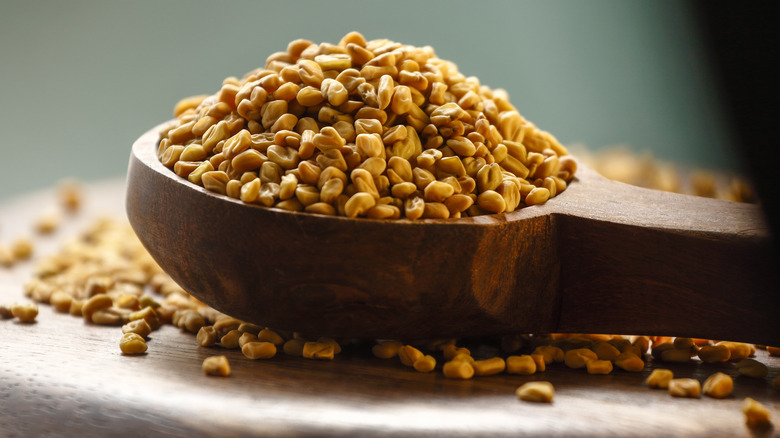The Little-Known Spice That Can Naturally Increase A Man's Libido
Looking to spice up your sex life? Look no further than your spice rack. A dip in one's sex drive from time to time isn't unusual, especially if you've been particularly exhausted or anxious lately. Other times, men may experience low libido due to the use of certain medications, psychological disorders, or having low levels of testosterone — a condition known as hypogonadism (via Merck Manual). It's also not uncommon for a man's sex drive to diminish as they grow older. Men with a suppressed libido may find that they don't fantasize about sex as often, aren't as sexually active, or lack overall interest in sexual activity. Depending on the cause, topical and/or injectable testosterone supplements may be suggested, as well as mental health counseling.
Although the research is limited, alternative medicine practices may also prove helpful, such as herb supplementation. A 2020 scientific review published in the scientific journal Pharmaceuticals outlines how some herbal aphrodisiacs have been linked with increases in sexual potency and libido. According to the National Center for Complementary and Integrative Health, fenugreek is a medicinal herb with a maple syrup-like flavor that's used as a spice in various foods. Along with its purported benefits of menstrual-cramp relief, enhanced milk production when breastfeeding, and reductions in blood sugar, fenugreek may also benefit men's sexual health.
Fenugreek may help boost libido and lower ED risk
In a 2011 randomized controlled trial published in Phytotherapy Research, 60 male patients who were not experiencing erectile dysfunction were given either a placebo or a daily oral dose of 600 milligrams of fenugreek extract and mineral formation for a duration of six weeks. Focusing on measurements of sexual drive as well as urge or desire, it was found that participants who received the intervention reported significant improvements in sexual arousal and orgasm. The study team concluded that fenugreek and mineral formation supplementation may benefit male libido as well as manage healthy blood testosterone levels.
Low libido may also be related to erectile dysfunction (ED), premature ejaculation, or delayed ejaculation, explains the Cleveland Clinic. In a 2024 study published in the Asian Journal of Andrology, researchers found that greater niacin consumption through food sources was correlated with a lower risk for erectile dysfunction. According to 2016 research published in the Saudi Journal of Biological Sciences, fenugreek seeds are rich in niacin, amongst many other vitamins and minerals. However, there are risks associated with high amounts of niacin supplementation, such as niacin toxicity (via StatPearls). Unless recommended by your doctor, it's best to stick with average amounts of the nutrient that you would normally get through diet.
Fenugreek may also benefit women's libido, but can come with risks
These potential benefits don't appear to be exclusive to men, however. Science shows that fenugreek may also boost women's sexual desire. In a 2021 study published in the scientific journal Clinical Phytoscience, researchers found that menstruating women experiencing sexual dysfunction displayed increases in levels of sexual desire-related hormones in association with fenugreek supplementation, resulting in reported decreases in sexual issues and irritability.
Next time you and your partner are cooking up a night of romance (literally), it may be worth adding a dash of fenugreek spice to a sauce or curry dish for dinner. Just be aware that while the National Center for Complementary and Integrative Health states dietary sources of fenugreek are thought to be safe, the herb can come with risks, particularly in the form of supplements. Possible side effects include digestive distress, nausea, or diarrhea. In more serious cases, a person may experience an allergic reaction, liver toxicity, or signs indicating your blood sugar levels have dropped too low. Furthermore, fenugreek supplements should not be given to children, and people who are pregnant are advised against ingesting more than what the average person would cook with.



